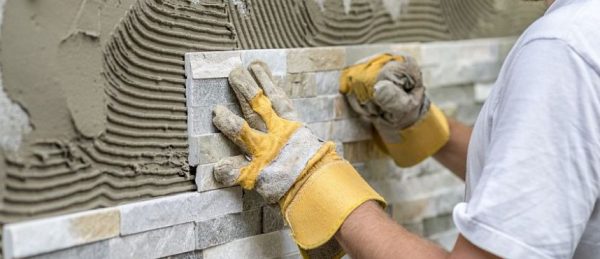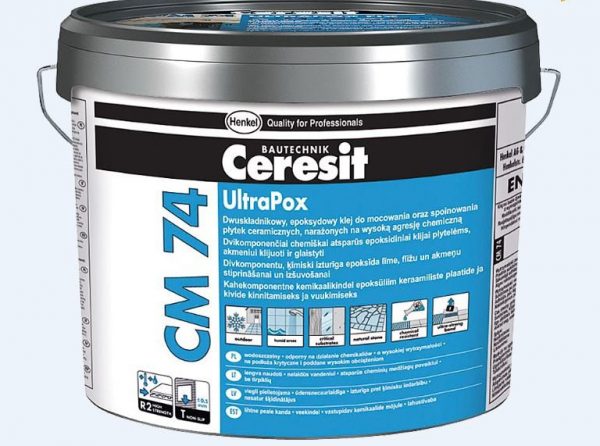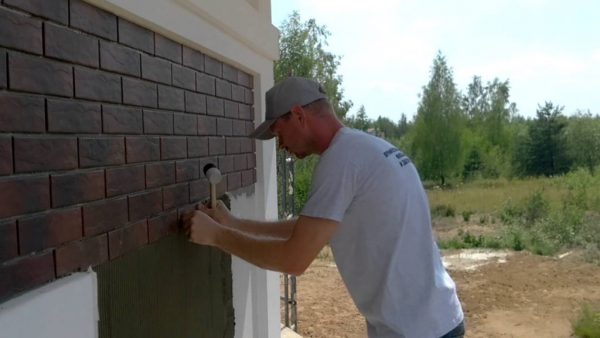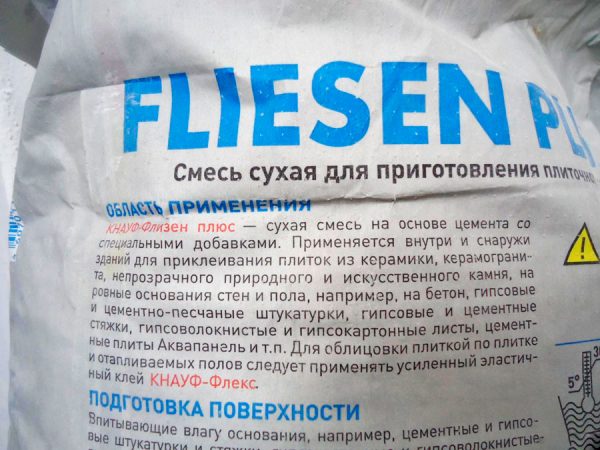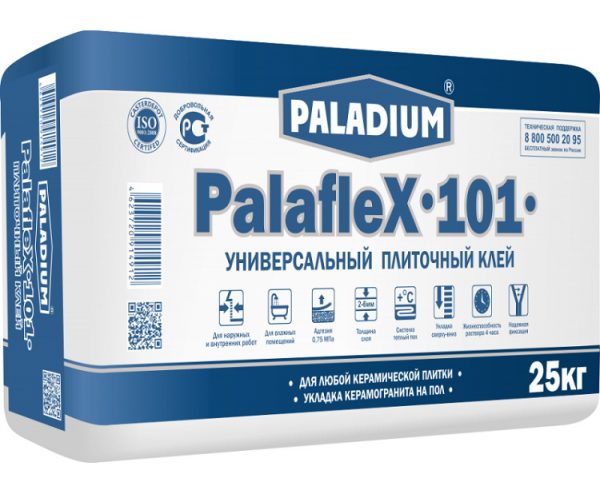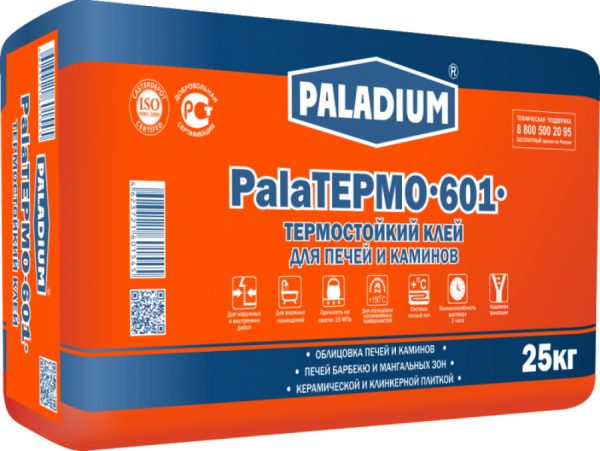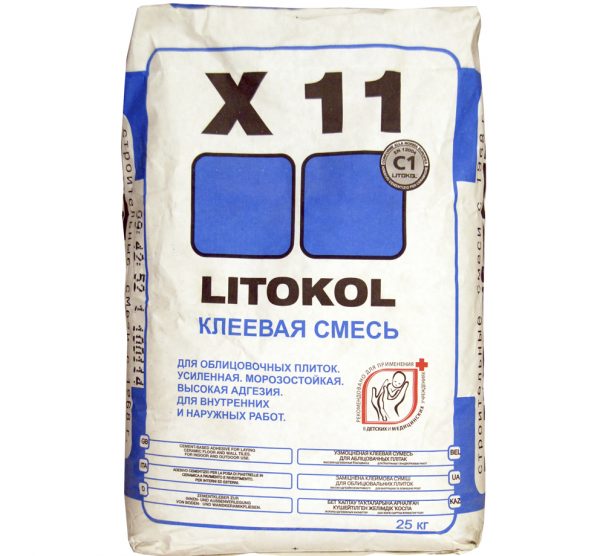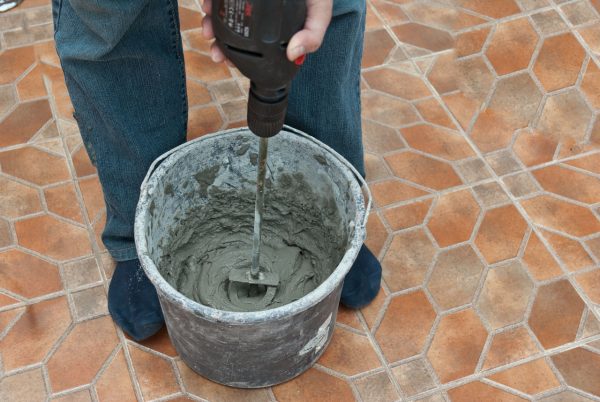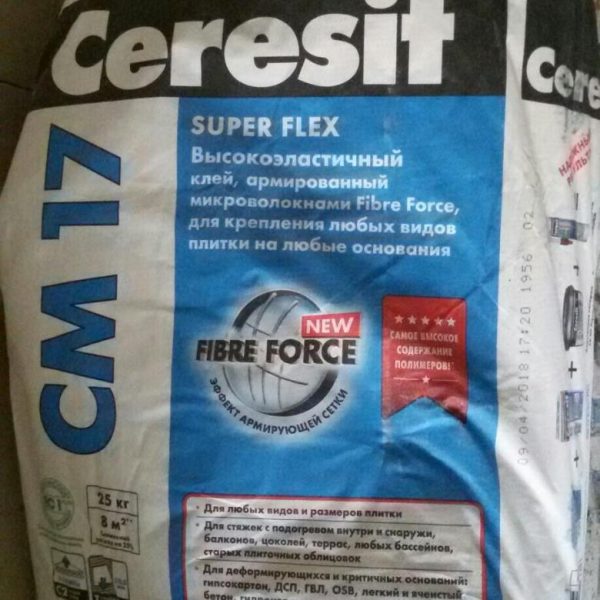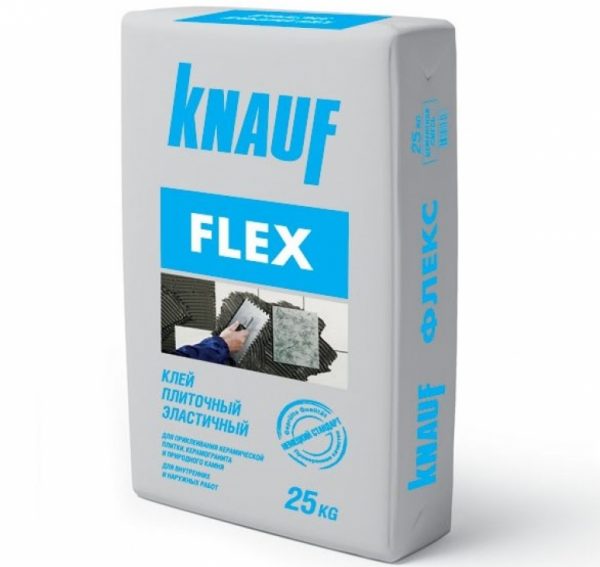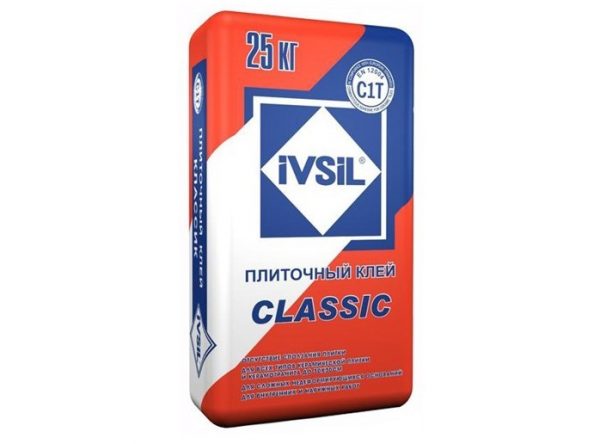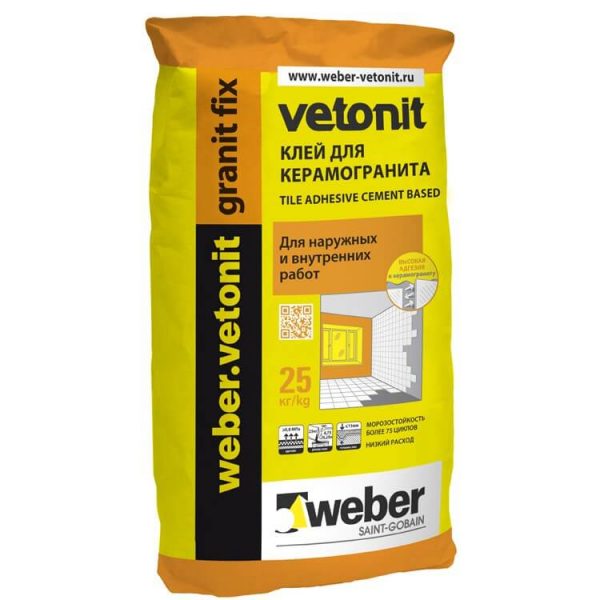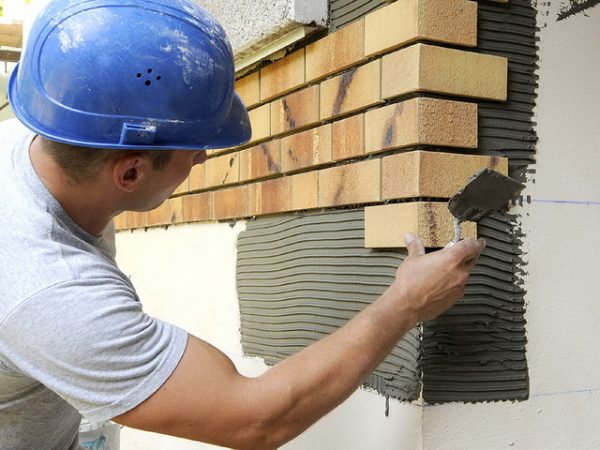For exterior decoration of the house now often used natural stone - marble, granite. The special tiles and porcelain tiles will look just as beautiful, but their laying is fraught with a number of difficulties.
- Features and composition of glue
- Glue mixture - what is it
- Types of glue for outdoor use
- Universal
- Reinforced
- For pool lining (moisture resistant)
- Heat resistant
- For non-standard surfaces
- Whites
- Frost resistant
- Criteria for choosing tile adhesives
- Ways to use frost-resistant glue
- Manufacturers and adhesives
- Ceresit
- Unis
- Knauf
- Vetonit
- Kreisel
- Ivsil
- "Litokol"
- “Found the Graniplix”
- "Weber Vetonit Granite Fix"
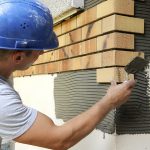
The main problem concerns the choice of high-quality adhesive for tiles, because it will be operated on the street, and, therefore, undergo weather changes. Tile adhesive for outdoor use must be frost-resistant and have a number of other important properties.
to contents ↑Features and composition of glue
The requirements for adhesives used outside buildings are always increased. First of all, the composition is required to easily tolerate freezing and thawing, not to respond to sudden changes in temperature. Frost resistance is all the more important, the north is the region of residence. If you lay the tile on ordinary glue, in the first winter period, the seam will begin to collapse.
The ability of the product to withstand freezing is due to the presence of special additives, additives in its composition. Such components do not allow water molecules to expand at sub-zero temperatures, and the condition of the adhesive joint remains stable. In conventional means, during freezing, the water expands, the layer of the agent separates, becomes covered with cracks. The glue base may be as follows:
- Epoxy. Adhesives containing epoxy resin are presented in two packages - the resin itself and the hardener. For outdoor work because of the high cost they are rarely used.
- Mineral Such adhesives are the most popular, ideal for internal and external works, economical in price and expense.
Usually mounting adhesive for outdoor installation easily tolerates a temperature drop of -50 degrees. At the same time, working with it is still recommended at positive temperatures, although some products allow application at -5 ... -15 degrees. The scope of adhesives is diverse:
- terraces, balconies, open areas;
- stairs, verandas;
- unheated rooms, country houses;
- baths;
- pools, etc.
Depending on the type of glue, with its help you can glue a variety of types of tiles - clinker, natural and artificial stone, granite and others.
to contents ↑Glue mixture - what is it
Usually, specialists prefer to use dry building adhesives, which are mixed with water until a solution is found and then used to stick the tiles. The mixtures are sold in durable paper bags with protection, do not contain lumps inside, but are a homogeneous small fraction of gray or white.
The exact composition of the glue varies depending on the manufacturer, brand, specific purpose. Usually it has:
- organic, mineral substances - limestone, cement, quartz sand, cobalt vitriol, dolomite (give the compound strength);
- polystyrene and other polymer additives (act as a frost-resistant component, serve to restore properties after diluting the mixture with water);
- thickeners and plasticizers (provide ductility, elasticity of the seam);
- synthetic additives and some minerals, for example, magnesium, aluminum, calcium (necessary to increase moisture resistance, adhesion of the adhesive mixture);
- cellulose ether (gives the desired viscosity).
Types of glue for outdoor use
Since many people choose a tile coating for exterior decoration of the house, you will have to purchase the right glue. Natural materials have a large weight, which creates a high load and forces you to select a particularly durable fastening system. Artificial tiles are lighter, but because of the structural features, they also require a reliable connection to the base. Which glue is best should be evaluated on a case-by-case basis. Below are the main types of adhesives.
to contents ↑Universal
Universal adhesives are called adhesives that are suitable for all types of tiles and various substrates - concrete, brick, aerated concrete, foam concrete, etc. Using such adhesives, it is possible to clad the internal walls of the house and facades. But the adhesion of universal compounds is usually at an average level, so you should not fasten them with a tile larger than 30 * 30 cm. If the base is complex, uneven, and the plates have impressive dimensions, you need to choose the profile glue.
to contents ↑Reinforced
In the composition of such adhesives are adhesion promoters - components that increase the reliability of the connection with the surface. Due to this, they can be used for facing large-format tiles. It is especially recommended to use reinforced adhesives for finishing floors, they can easily withstand daily dynamic and static loads. Also, agents with enhanced adhesion will be needed for fixing marble, granite and other types of stone. Most reinforced adhesives are resistant to temperature and humidity.
to contents ↑For pool lining (moisture resistant)
Such adhesives can withstand high humidity, as well as constant contact with water. For outdoor use, waterproof adhesives are rarely required. Usually they finish the internal tanks of pools, other water tanks, toilets, car washes, they are especially well suited for the installation of mosaic coating. Most formulations include special antifungal components that prevent fungus and mold from multiplying.
to contents ↑Heat resistant
Such adhesives are usually used for decorating stoves, fireplaces, which are located in unheated rooms, as well as for facing barbecue areas and other outdoor heated equipment. Heat-resistant adhesives are well suited for ceramic tiles, fireclay and ceramic bricks.
They contain plasticizers, a cement-sand mixture, polymers and synthetic additives. Most often, they withstand temperatures ranging from -40 ... + 150 degrees, but there are fire-resistant compounds that can easily tolerate direct contact with fire and temperatures up to +1200 degrees.
to contents ↑For non-standard surfaces
Such mixtures are used if laying is planned on metal, painted surfaces, on old tiles or on deformable substrates - young concrete, wood, OSB, other materials subject to shrinkage, deformation. A distinctive feature of adhesives is a combination of high adhesion with excellent elasticity, which prevents the adhesive joint from being damaged during displacement.
Whites
The basis of such adhesives is not gray, but white cement, as well as synthetic additives. Compositions are used for cladding street surfaces from translucent, transparent or light tiles, to create facade stained-glass windows. In the presence of moisture resistance, tools are useful for finishing pools. Also, white compounds are often used as a filler for tile joints.
Frost resistant
In fact, any glue for street work should have a sufficient level of frost resistance - withstand several cycles of freezing and thawing.The composition contains special additives that ensure the stability of the adhesive joint to temperature extremes, protecting against delamination and deformation. Frost-resistant adhesives perfectly fit on concrete, brick, and other popular types of substrates. The consumption of such adhesives when laying a small tile is small, because the layer can be made thin. For large-format plates, consumption increases due to the application of glue on two surfaces with a thicker layer.
to contents ↑Criteria for choosing tile adhesives
On the packaging of the product there is an exact composition, operating temperatures, scope, there is also a clear indication of the possibility of use for outdoor work. Responsible manufacturers describe in detail the application, give advice and useful recommendations, specify the cost of funds.
The first thing to consider when buying is whether the glue is suitable for the specific type of finishing material. For example, if the ability to stick small-format tiles is indicated on the pack of tools, it is extremely undesirable to use glue for facing with porcelain tiles and tiles more than 20 * 20 cm. After a short time, the finish will peel off or the adhesive joint will become cracked from a high load.
Other glue selection criteria are as follows:
- Frost resistance. The higher the number of possible freezing and thawing cycles, the longer the masonry will remain. Most mixtures withstand 35-40 cycles, but there are those that tolerate 100-110 without loss of quality. You also need to take into account the limit of minus temperatures and compare with the minimum for the region. In the northern latitudes it is better to choose glue that can be used at temperatures up to -50 degrees.
- Type of base. It is important to take into account the material of the surface to be faced, as well as its uniformity. The easiest way is to lay glue on a flat, without differences, base of brick and concrete. On the package must necessarily be an indication of the elasticity of the composition, if it is to be used for prone to shrinkage, other deformable substrates. Laying tiles on a surface with defects, bumps requires the use of glue with leveling properties.
- Moisture resistance. If the product is regularly in contact with moisture, it must be waterproof. It is recommended to purchase moisture-resistant adhesives not only for pool lining, but also if precipitation can get on the finished coating. In the presence of such properties, the glue line will last longer.
- Application Parameters. For a person without experience, the time allotted for the adjustment of the tile, as well as the period of suitability of the solution for use, is of great importance. Some compositions already after 10 minutes do not give the opportunity to correct the location of the elements, others allow you to adjust them even after 30 minutes, and only then set. The viability of the solution is also important for the user: the higher it is, the larger portions can be prepared at a time, and the less time it takes to dilute the glue.
to contents ↑
Ways to use frost-resistant glue
Before starting work, you need to purchase all the necessary materials, come up with a facade cladding scheme or other bases, draw up a sketch. Next, you need to thoroughly prepare the surface: clean it, level it, remove all loose elements, especially falling plaster. When buying special glue, it is even possible to impose a new tile on the old one, but according to the previous coating, notches should be made every 5 cm in a checkerboard pattern. All street surfaces to be lined must be primed. Strongly absorbent bases are treated with soil 2 times.
Glue is bred according to the instructions on the package. The dry mixture is poured into a strictly measured amount of water, mixed with a drill with a nozzle or a construction mixer.The solution is applied to the base with a notched trowel, carefully distribute it. The tile is pressed, pressed so that there are no voids inside, carefully tap with a rubber mallet. Between the elements leave seams of the desired width.
Experienced craftsmen use the following techniques when laying tiles on the street:
- a thin layer of cement is applied over the laid glue, which will bind water and improve the strength of the joint;
- PVA is sprayed on the back of the tile and sprinkled with dry cement, which gives a similar effect and helps the glue to spread more evenly.
to contents ↑Upon completion of work, it is necessary to leave the finished surface until it dries completely, without exposing it to operation, and only then grout the joints. All work should be carried out at temperatures above +5 degrees (with the exception of cases of the use of profile compounds used at subzero temperatures).
Manufacturers and adhesives
Most major manufacturers in the assortment have several tools intended for outdoor use. Companies produce the highest quality tile adhesives Ceresite, "Vetonit", "Knauf" and others.
Ceresit
For outdoor use, you can purchase such adhesives of this brand:
- "Cerezit SM 17". It has high elasticity, excellent adhesion, it can be used for outdoor laying of any tile, including porcelain. Frost resistance is about 100 cycles. The product easily withstands temperatures from -50 to +70 degrees.
- "Cerezit SM 117." This glue is not suitable only for marble, all other types of finishing materials will be firmly fixed to surfaces made of concrete, cement, limestone, brick. Frost resistance is also 100 cycles. Can be used for lining pools.
Unis
High-strength glue "Eunice 2000" approved for outdoor use. He glues tiles and ceramic tiles, porcelain tiles outside buildings, evens out differences up to 15 mm. The glue has a high margin of safety, the highest level of adhesion and can withstand temperatures up to -50 degrees.
Knauf
This manufacturer is highly respected among professionals. The downside is only the expensive price of glues of this brand, but their quality remains consistently high. Here are the suitable formulations:
- Knauf Fassaden. It is used for fastening small-format tiles and thermal insulation on all types of substrates, and can participate in “warm wall” systems. It has water repellent and frost resistance up to 75 cycles.
- Knauf Fliesen Plus. Reinforced adhesive for exterior and interior use, suitable for laying tiles up to 40 * 40 cm for wall decoration, with porcelain stoneware and tiles up to 60 * 60 cm for flooring. It is allowed for gluing socles, suitable for laying natural and artificial stone. It is used only for non-deformable substrates. Frost resistance - 75 cycles.
- Knauf Flex. Highly elastic adhesive for deformable substrates. It can be used for outdoor work with tiles without limitation in appearance, format, weight. Suitable for all surfaces, including those from GSP, GVL, “Aquapanel” cement slabs. It is especially recommended for facing bases subject to high loads - balconies, terraces, floors, used for finishing bowls of indoor pools.
Vetonit
Vetonit Ultra Fix glue has a high level of frost resistance. It withstands temperatures from -80 to +80 degrees, including temperature differences. The adhesion strength is unique, it is 1.8 MPa, which is a very high rate. The product is suitable for clinker and ceramic tiles, porcelain stoneware, natural and artificial stone. The glue is ideal for old foundations, facades and socles, it has the function of sealant.
to contents ↑Kreisel
Under the brand name Kraisel, a high-quality Multi 102 product is available, suitable for indoor and outdoor use. Tile adhesive has an average adhesion index (0.5 MPa), therefore it is suitable only for fastening small-format, medium-format tiles. It is very economical in consumption, has a low price.
Ivsil
Ivsil Classic winter tile adhesive can be applied even at low outdoor temperatures - up to -15 degrees. Due to the good adhesion level (1 MPa), the tool is useful for large tiles (up to 60 * 60 cm). For this type of technology, laying from top to bottom is available, since the creep of the composition is excluded. Due to the large time for adjusting the position of the elements (20 minutes), even beginners can use glue.
to contents ↑"Litokol"
Litoflex K80 is an elastic, frost-resistant installation compound designed for tiles and porcelain stoneware. It is ideal for outdoor work on any mineral substrates. The maximum size of the tile can be 45 * 45 cm. The tool is also used for finishing facades, including the technology "tile on tile".
“Found the Graniplix”
This dust-free composition for porcelain stoneware, ceramic tiles and natural stone withstands temperatures of -50 ... + 75 degrees, is waterproof, has an increased mortar pot life. It has a high level of adhesion, therefore it holds even heavy tiles. It can be used for cladding facades, pools, terraces, balconies, suitable for gluing polystyrene foam for wall insulation.
to contents ↑"Weber Vetonit Granite Fix"
The frost resistance of this glue is unique - it is equal to 150 cycles. The adhesion index is also at a high level (1.1 MPa). Suitable for tiles of all formats, double firing, mosaics, porcelain tiles when laying on strong and deformable substrates. The product is highly elastic and helps to smooth surfaces with differences of up to 10 mm.
Do not buy ordinary inexpensive adhesives for outdoor applications. Without the necessary indicators of adhesion, frost resistance, elasticity, the masonry will quickly collapse, and you will have to do the work again. The acquisition of a quality product of a reliable brand guarantees a long service life of the coating without problems and complaints.

